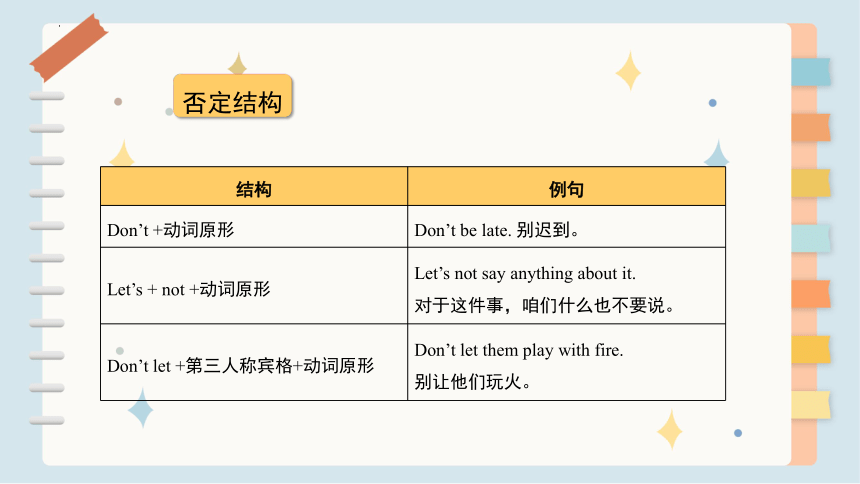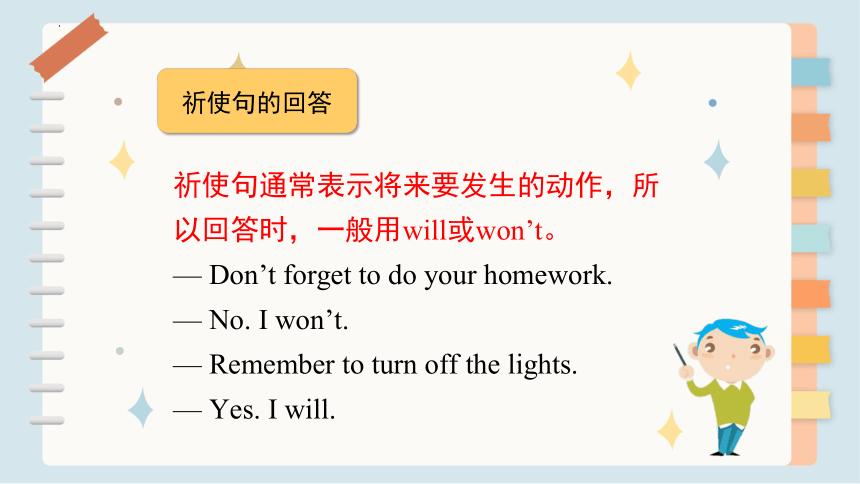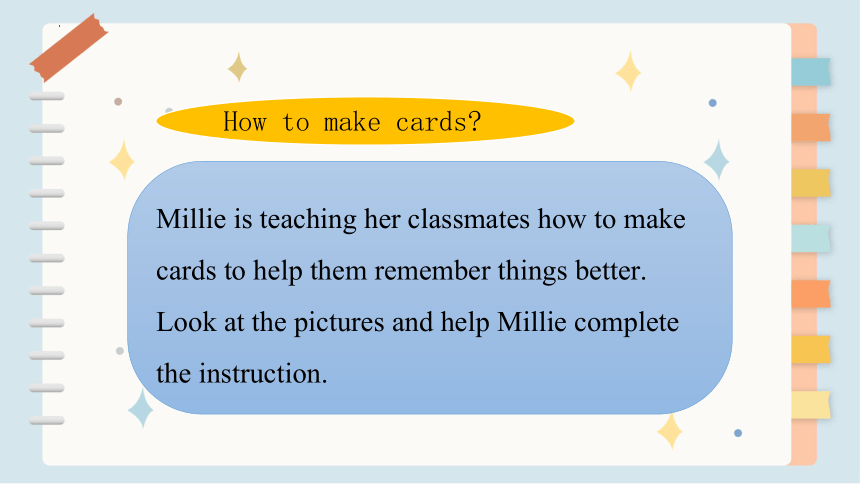Unit 4 Do it yourself Grammar 课件(22张PPT) 牛津译林版英语八年级上册
文档属性
| 名称 | Unit 4 Do it yourself Grammar 课件(22张PPT) 牛津译林版英语八年级上册 |

|
|
| 格式 | pptx | ||
| 文件大小 | 2.4MB | ||
| 资源类型 | 教案 | ||
| 版本资源 | 牛津译林版 | ||
| 科目 | 英语 | ||
| 更新时间 | 2024-10-11 00:00:00 | ||
图片预览









文档简介
(共22张PPT)
Unit4
Do it yourself
Grammar
No smoking!
No fishing!
Don’t turn right!
Don’t park your car!
Read and think
Turn left! Don’t pick the flowers!
Turn right! Don’t smoke!
Let me help you. Don’t be late again!
Be quiet, please. Don’t park your car!
Please go upstairs! Please don’t eat!
Read the following sentences and tell their meanings.
When do we use these sentences
We use these sentences to give orders or instructions .
They are called imperatives.(祈使句)
Draw the conclusion (得出结论)
Turn left! Don’t pick the flowers!
Turn right! Don’t smoke!
Let me help you. Don’t be late again!
Be quiet, please. Don’t park your car!
Please go upstairs! Please don’t eat!
祈使句的结构如下:
Do sth
Don’t do sth.
肯定:
否定:
How to be more polite
(Please)
(,please)
祈使句结构
肯定结构
① Do型(以行为动词原形开头)
例如: Sit down! 坐下! Stand up! 起立!
② Be型(以be开头)
例如:Be quiet! 安静!
Be careful!小心!
③ Let型(以let开头)
例如: Let me try. 让我试试看。
Let’s look at the map. 让我们看看地图。
否定结构
结构 例句
Don’t +动词原形 Don’t be late. 别迟到。
Let’s + not +动词原形 Let’s not say anything about it.
对于这件事,咱们什么也不要说。
Don’t let +第三人称宾格+动词原形 Don’t let them play with fire.
别让他们玩火。
祈使句的回答
祈使句通常表示将来要发生的动作,所
以回答时,一般用will或won’t。
— Don’t forget to do your homework.
— No. I won’t.
— Remember to turn off the lights.
— Yes. I will.
How to make cards
Millie is teaching her classmates how to make cards to help them remember things better. Look at the pictures and help Millie complete the instruction.
Please (6) _____________ (not) up. (7) _____________ trying and you will find
you can remember things better.
cut
draw
write
give
keep
look
try
Cut
Write
Draw
try
don’t give
Keep
Look
区分祈使句和动名词作主语。
1. Lucy her homework by herself.(do)
2. Lucy, your homework by yourself.(do)
3. Lucy, ______ your homework is important.(do)
does
do
doing
4. ________ the apples and eat them. (pick)
5. ________ the apples is great fun. (pick)
6. ________everyday makes you smart.(read)
7. ________the books and answer the
questions.(read)
Pick
Picking
Reading
Read
(1)Why not fill our lives with________ Be happy and________every day!
A. happy; smile B. happily; smiling C. joy; smiling D. joy; smile
(2)-Don't forget to bring your homework to school tomorrow.-________.
A. OK! I will B. OK! I won't C. I'm afraid I will D. I'm afraid I won't
(3)—____________your geography book here tomorrow. Don’t leave it at home again.—____________.
A. Take; No, I don’t. B. Take; No, I won’t.
C. Bring; No, I don’t. D. Bring; No, I won’t.
(4)______the salad in the fridge for a while can make it _____better.
A.Keeping; taste B.Keep; taste C.To keep; tastes D.Keeping; tastes
(5) Don’t watch too much TV, _______
A. will you B. won’t you C. shall we D. do you
(6)_______ out your love, and the world will become a better place to live in.
A. Speak B. To speak C. Spoke D. Speaking
(7)—Sometimes mistakes are also our friends.—I think so. We shouldn't say “_______”very often when children try doing something.
A. Be patient B. Keep tryingC. Don't give up D. Don't make mistakes
(8)—Mum, is this big cake for us
—Sure, Mary,________it into pieces and let’s share it.
A.to cut B. cutting C. cut D. cuts
(9)If you want to become a “do-it-yourselfer”,________to DIY class.
A.come B.coming C.to come D.came
(10)I’m hungry. Let us go out for a big lunch, ________
A. won’t we B. don’t you C. shall we D. will you
答案:ADCAD
(11)—Kate, ________the phone. I’m making a birthday cake.
—Coming, Mum.
A. answers B. answer C. to answer D. answering (12)_________ late again, Bill!
A. Don’t to be B. Don’t be C. Not be D. Be not (13)_________ cross the road until the traffic lights turn green. A. Not B. Won’t C. Doesn’t D. Don’t
(14) Let’s do it at once, _________
A. shall we B. will you C. do we D. do you
Using should and had better
Suzy doesn’t think her cousin knows much about DIY either. What did she advise him to do What do you think she said to him about this
He should read more books about DIY.
He had better read more books about DIY.
He should take a course in DIY.
He bad better take a course in DIY.
He should not paint the whole house blue.
He had better not paint the whole house blue.
当我们给他人提建议时,可以用had better和should,表示“最好”或“应该”做某事, had better的语气比should强一些,两者后面都加动词原形。
你的手表坏了, 你最好买个新的。
Your watch is broken. You had better buy a new one.
你应该对DIY有点了解。
You should know a little about DIY.
(1) had better
(通常简略为’d better)+动词原形
否定形式:had better (not) do sth.
汤姆,你最好今天去那儿。
Tom, you’d better go there today.
你最好不要错过末班公共汽车。
You had better not miss the last bus.
(2) should +动词原形
should 的否定式是should not/shouldn’t。
你应该戒烟。
You should give up smoking.
你不应该看太多电视。
You shouldn’t watch too much TV.
Advice on being a good student
should (not); had better (not)
You _______________________ be late for school.
You _________________ listen carefully in class.
shouldn’t / had better not
should / had better
You _______________________ look out of the
window in class.
You _________________ keep your classroom clean.
You _________________ be friendly to others.
You _______________________ talk in class.
should / had better
should / had better
shouldn’t / had better not
shouldn’t / had better not
Can you give the man some advice
1. Will you please read it again more slowly
(改为祈使句)
_______ again more slowly, please.
2. If you don't listen to me, I'll go.
(改为同义句)
________ me, or I'll go.
3. The teachers often tell the students not to
be careless. (改为祈使句)
________ careless, please.
4. Please sit next to Nancy. (改为否定句)
________ next to Nancy.
Read it
Listen to
Don't be
Don't sit
1. 你应该在南京换火车。
__________ change trains at Nanjing.
2. 你最好在下雨前回家。
___________________ before the rain starts.
3. 现在你最好别打棒球了。
_____________________ baseball now.
4. 不要把金鱼放在阳光下。
_________ the goldfish in the sun.
You should
You'd better go home
You had better not play
Don’t put
Unit4
Do it yourself
Grammar
No smoking!
No fishing!
Don’t turn right!
Don’t park your car!
Read and think
Turn left! Don’t pick the flowers!
Turn right! Don’t smoke!
Let me help you. Don’t be late again!
Be quiet, please. Don’t park your car!
Please go upstairs! Please don’t eat!
Read the following sentences and tell their meanings.
When do we use these sentences
We use these sentences to give orders or instructions .
They are called imperatives.(祈使句)
Draw the conclusion (得出结论)
Turn left! Don’t pick the flowers!
Turn right! Don’t smoke!
Let me help you. Don’t be late again!
Be quiet, please. Don’t park your car!
Please go upstairs! Please don’t eat!
祈使句的结构如下:
Do sth
Don’t do sth.
肯定:
否定:
How to be more polite
(Please)
(,please)
祈使句结构
肯定结构
① Do型(以行为动词原形开头)
例如: Sit down! 坐下! Stand up! 起立!
② Be型(以be开头)
例如:Be quiet! 安静!
Be careful!小心!
③ Let型(以let开头)
例如: Let me try. 让我试试看。
Let’s look at the map. 让我们看看地图。
否定结构
结构 例句
Don’t +动词原形 Don’t be late. 别迟到。
Let’s + not +动词原形 Let’s not say anything about it.
对于这件事,咱们什么也不要说。
Don’t let +第三人称宾格+动词原形 Don’t let them play with fire.
别让他们玩火。
祈使句的回答
祈使句通常表示将来要发生的动作,所
以回答时,一般用will或won’t。
— Don’t forget to do your homework.
— No. I won’t.
— Remember to turn off the lights.
— Yes. I will.
How to make cards
Millie is teaching her classmates how to make cards to help them remember things better. Look at the pictures and help Millie complete the instruction.
Please (6) _____________ (not) up. (7) _____________ trying and you will find
you can remember things better.
cut
draw
write
give
keep
look
try
Cut
Write
Draw
try
don’t give
Keep
Look
区分祈使句和动名词作主语。
1. Lucy her homework by herself.(do)
2. Lucy, your homework by yourself.(do)
3. Lucy, ______ your homework is important.(do)
does
do
doing
4. ________ the apples and eat them. (pick)
5. ________ the apples is great fun. (pick)
6. ________everyday makes you smart.(read)
7. ________the books and answer the
questions.(read)
Pick
Picking
Reading
Read
(1)Why not fill our lives with________ Be happy and________every day!
A. happy; smile B. happily; smiling C. joy; smiling D. joy; smile
(2)-Don't forget to bring your homework to school tomorrow.-________.
A. OK! I will B. OK! I won't C. I'm afraid I will D. I'm afraid I won't
(3)—____________your geography book here tomorrow. Don’t leave it at home again.—____________.
A. Take; No, I don’t. B. Take; No, I won’t.
C. Bring; No, I don’t. D. Bring; No, I won’t.
(4)______the salad in the fridge for a while can make it _____better.
A.Keeping; taste B.Keep; taste C.To keep; tastes D.Keeping; tastes
(5) Don’t watch too much TV, _______
A. will you B. won’t you C. shall we D. do you
(6)_______ out your love, and the world will become a better place to live in.
A. Speak B. To speak C. Spoke D. Speaking
(7)—Sometimes mistakes are also our friends.—I think so. We shouldn't say “_______”very often when children try doing something.
A. Be patient B. Keep tryingC. Don't give up D. Don't make mistakes
(8)—Mum, is this big cake for us
—Sure, Mary,________it into pieces and let’s share it.
A.to cut B. cutting C. cut D. cuts
(9)If you want to become a “do-it-yourselfer”,________to DIY class.
A.come B.coming C.to come D.came
(10)I’m hungry. Let us go out for a big lunch, ________
A. won’t we B. don’t you C. shall we D. will you
答案:ADCAD
(11)—Kate, ________the phone. I’m making a birthday cake.
—Coming, Mum.
A. answers B. answer C. to answer D. answering (12)_________ late again, Bill!
A. Don’t to be B. Don’t be C. Not be D. Be not (13)_________ cross the road until the traffic lights turn green. A. Not B. Won’t C. Doesn’t D. Don’t
(14) Let’s do it at once, _________
A. shall we B. will you C. do we D. do you
Using should and had better
Suzy doesn’t think her cousin knows much about DIY either. What did she advise him to do What do you think she said to him about this
He should read more books about DIY.
He had better read more books about DIY.
He should take a course in DIY.
He bad better take a course in DIY.
He should not paint the whole house blue.
He had better not paint the whole house blue.
当我们给他人提建议时,可以用had better和should,表示“最好”或“应该”做某事, had better的语气比should强一些,两者后面都加动词原形。
你的手表坏了, 你最好买个新的。
Your watch is broken. You had better buy a new one.
你应该对DIY有点了解。
You should know a little about DIY.
(1) had better
(通常简略为’d better)+动词原形
否定形式:had better (not) do sth.
汤姆,你最好今天去那儿。
Tom, you’d better go there today.
你最好不要错过末班公共汽车。
You had better not miss the last bus.
(2) should +动词原形
should 的否定式是should not/shouldn’t。
你应该戒烟。
You should give up smoking.
你不应该看太多电视。
You shouldn’t watch too much TV.
Advice on being a good student
should (not); had better (not)
You _______________________ be late for school.
You _________________ listen carefully in class.
shouldn’t / had better not
should / had better
You _______________________ look out of the
window in class.
You _________________ keep your classroom clean.
You _________________ be friendly to others.
You _______________________ talk in class.
should / had better
should / had better
shouldn’t / had better not
shouldn’t / had better not
Can you give the man some advice
1. Will you please read it again more slowly
(改为祈使句)
_______ again more slowly, please.
2. If you don't listen to me, I'll go.
(改为同义句)
________ me, or I'll go.
3. The teachers often tell the students not to
be careless. (改为祈使句)
________ careless, please.
4. Please sit next to Nancy. (改为否定句)
________ next to Nancy.
Read it
Listen to
Don't be
Don't sit
1. 你应该在南京换火车。
__________ change trains at Nanjing.
2. 你最好在下雨前回家。
___________________ before the rain starts.
3. 现在你最好别打棒球了。
_____________________ baseball now.
4. 不要把金鱼放在阳光下。
_________ the goldfish in the sun.
You should
You'd better go home
You had better not play
Don’t put
